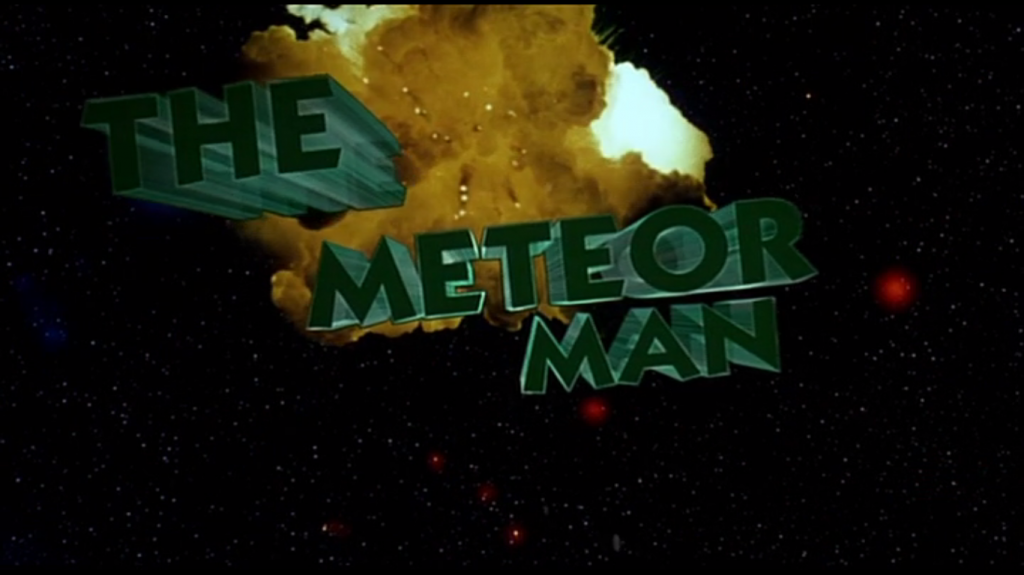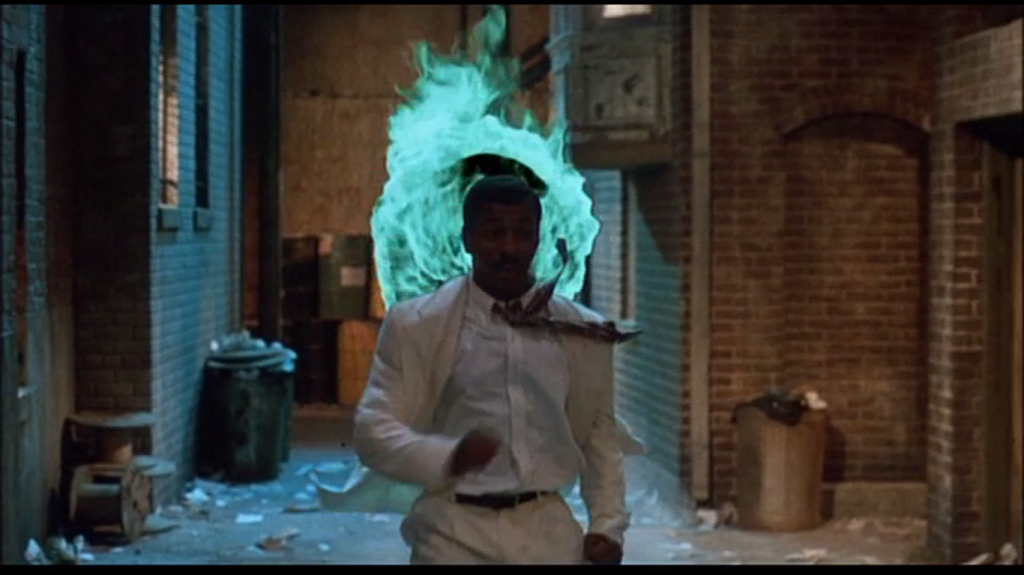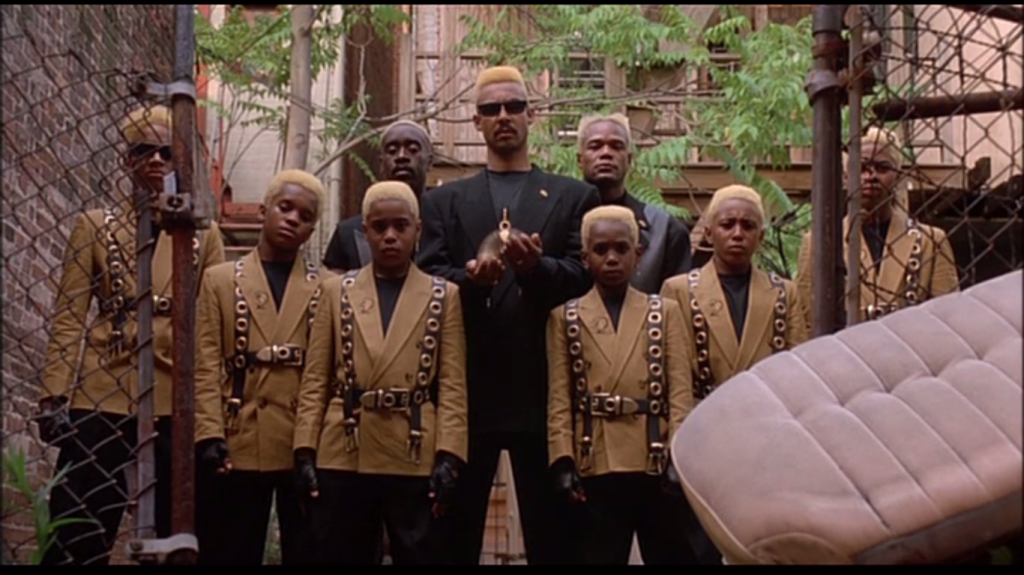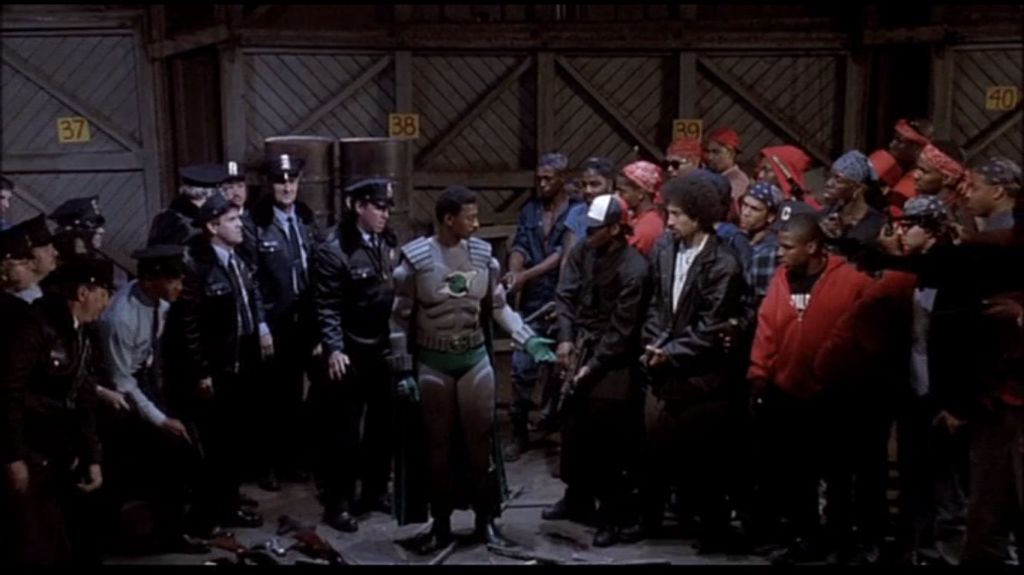Diversity and representation have long been a serious issue in the film industry, and 12 Years A Slave winning some Oscars hasn’t exactly changed that. Outside of that prestigious anomaly, people rarely imagine black film to be much more than gangster movies, cookout comedies, and Tyler Perry. Our very own Dominic Griffin will prove otherwise, shedding a light on unsung, underrated, forgotten and new films that show the breadth and versatility of the black voice in film. Named after one of Billy Dee Williams’ affectionate nicknames, this is Dark Gable Presents…
Robert Townsend’s Hollywood Shuffle was the first film this column tackled back in 2014, so with all the vitriol being spewed about Batman v. Superman: Dawn of Justice and its lack of aspiration, we thought it’d be a great time to revisit The Meteor Man. The film was released in 1993, barely recouping a third of its modest budget, but proving light years ahead of the industry. At $30 million, you could make ten The Meteor Mans for the price of any modern superhero tentpole. Like BvS, The Meteor Man is currently sitting pretty on Rotten Tomatoes with a posh 29% rating. Unlike, BvS, The Meteor Man succeeds in being legitimately uplifting, despite being an imperfect, somewhat corny endeavor.
Until Ben Affleck actually sits in the director’s chair for a future Batman solo effort, Townsend remains the only notable filmmaker to write, helm and star in his own superhero film. He leads as Jefferson Reed, a substitute teacher moonlighting as a jazz musician in Washington, D.C. After a giant, comically green meteor hits him, he’s granted a coterie of unconnected superpowers, ranging from staples like flight and invulnerability to outliers like the ability to communicate with animals and temporarily absorbing knowledge from books through physical contact. His neighborhood is plagued by a gang called The Golden Lords, led by iconic baddie Simon Caine (Roy Fegan). At the behest of his family and community, Jefferson uses his new found abilities to enact change and clean up his city as “Meteor Man.”
Jefferson, like most Townsend protagonists, is a likable, flawed everyman. Although this film owes visually to the Richard Donner Superman films (just peep those opening credits and that score), the general tenor of Jefferson’s arc feels much more like a classic Marvel origin. It isn’t that he’s a reluctant hero, necessarily. Jefferson isn’t a particularly selfish or callous man. He’s just like your average guy. He means well, but is conflict averse. His life has followed the path of least resistance for so long that switching lanes now seems even more impossible than this new gift he’s acquired. He’s the kind of person who tells students to run from bullies. Without outside influence, he basically just uses his powers to talk to his dog and see under women’s clothes (a particularly skeevy motif in the film made slightly more chaste by only showing people in tasteful undergarments).
It’s Jefferson’s parents, Ted (Robert Guillaume) and Maxine (Marla Gibbs), who steer him in the right direction. If Kevin Costner’s “hero cake” monologue didn’t do it for you in BvS, you’re going to find a lot to love watching Guillaume light a fire under his son’s ass. It’s the most fun the veteran actor had during this era of his career outside of Sports Night, and Gibbs balances out his passionate anger with a lot of wit and heart. Jefferson’s father isn’t afraid of any gangs and his mother doesn’t suffer her son’s obstinate apathy well. Alongside influence from other community members (like James Earl Jones’ Earnest Moses, a jazz aficionado obsessed with staying hip through hilarious wigs), Jefferson essentially gets passive-aggressively nagged into superherodom. You would be forgiven for assuming a big, shocking death would be the catalyst that gets him to put on a cape, but the actual lighting of the fuse is more ponderous.
The neighborhood gets together for a community watch meeting where they pitch Jefferson on using his powers for good, but he’s still left on the fence. His solemn walk home is what cinches it. Jefferson’s apartment building has turned into a crime scene because The Golden Lords jumped and assaulted his landlady, a woman who the film has demonstrated always showed Jefferson great kindness. It isn’t just the act of violence that finally breaks him. It’s listening to Earnest lie to the police about not having seen anything. Even after all the sanctimonious pontificating at the community meeting, when presented with an actual situation where his ideals could be put into action, Earnest was still fundamentally unable to act.
This moment has such resonance, despite being sandwiched between a great deal of broad comedy. The montage of Jefferson becoming Meteor Man that follows is about as cringe-worthy as the film gets in terms of pure camp, but still is tempered with a genuine likability and clarity of style. The special effects are modest and the general look of the film is pretty cheap, but the cast is so full of big names and recognizable faces that it feels like a larger affair. You get Eddie Griffin as Michael, Jefferson’s science teacher colleague who sort of doubles as a Jimmy Olsen-esque comrade. There’s a young Don Cheadle as Simon Caine’s personal Starscream, Goldilocks, who steals every scene he’s in. That on top of a litany of off kilter music industry cameos, from Cypress Hill and Naughty By Nature as the Crips and Bloods, respectively, and Luther Vandross as a wordless heavy.
But there’s a struggle of tone, between the very real concerns of the film’s narrative (the proliferation of gang violence) and the spoonful of sugar used to swallow such heady subject matter (a hefty amount of slapstick-y humor). Moments like Earnest being too terrified to talk to the police ground those flights of fancy and cheap laughs in real pathos.
If The Meteor Man has a real failing, it’s that the film doesn’t push that particular envelope hard enough. There’s a very comic book appropriate surface conflict between Jefferson and The Golden Lords that is a straightforward, black and white depiction of right and wrong. The gang, with their stylized platinum dye jobs and absurd chevron formations, are about as cartoonish as they come. In other conflicts, like Meteor Man settling a dispute between rival real gangs and the police, imply a level of thematic complexity this movie isn’t equipped to explore. The narrative is so principally concerned with the blight of black-on-black crime, that it heavily ignores the systemic oppression inexorably tied to these problems. That’s a real tragedy, considering Frank fucking Gorshin plays the white gangster pulling The Golden Lords’ strings and never once gets to let loose as a megalomanical mastermind.
In 1993, however, such in depth societal exploration was probably a lot to ask of a superhero comedy that, realistically, was a miracle for even getting made in the first place. Other than Steel and the Blade films, we’re still waiting for a black led superhero film here in 2016, and a superhero movie comes out every fifteen fucking minutes. For what it’s worth, The Meteor Man is an effective piece of entertainment. When it aims for laughs, it gets them. When it slows down the pace to make a statement about standing up for your values, it resonates. The film culminates in a big set piece where Simon Caine temporarily gets superpowers, too, so we’re treated to the requisite Superman vs. Zod-style throwdown, but before that, Jefferson loses his abilities and stands up to Caine anyway.
Jefferson gets the shit kicked out of him while the entire neighborhood watches: This is the first time he has to be a real hero, not just a guy who can fly and do whatever he wants. This inspires everyone else to do the same, which offers the closed loop of a lot of neat, smaller arcs the film has seeded throughout. It also gives us a scene with numerous, frying pan-wielding aunties assaulting Deebo from Friday, which is probably the most indelible image the movie burns into your mind.
As a superhero film, sure, it’s a little shaky, especially in terms of production value, but even today, The Meteor Man presents a sound sense of morality that inspires without having to pander. It’d be nice to see more of that kind of thing.
If you have any films you would like to see covered in this column, hit us up on Twitter @DeadshirtDotNet and we’ll get them in front of Dom.





